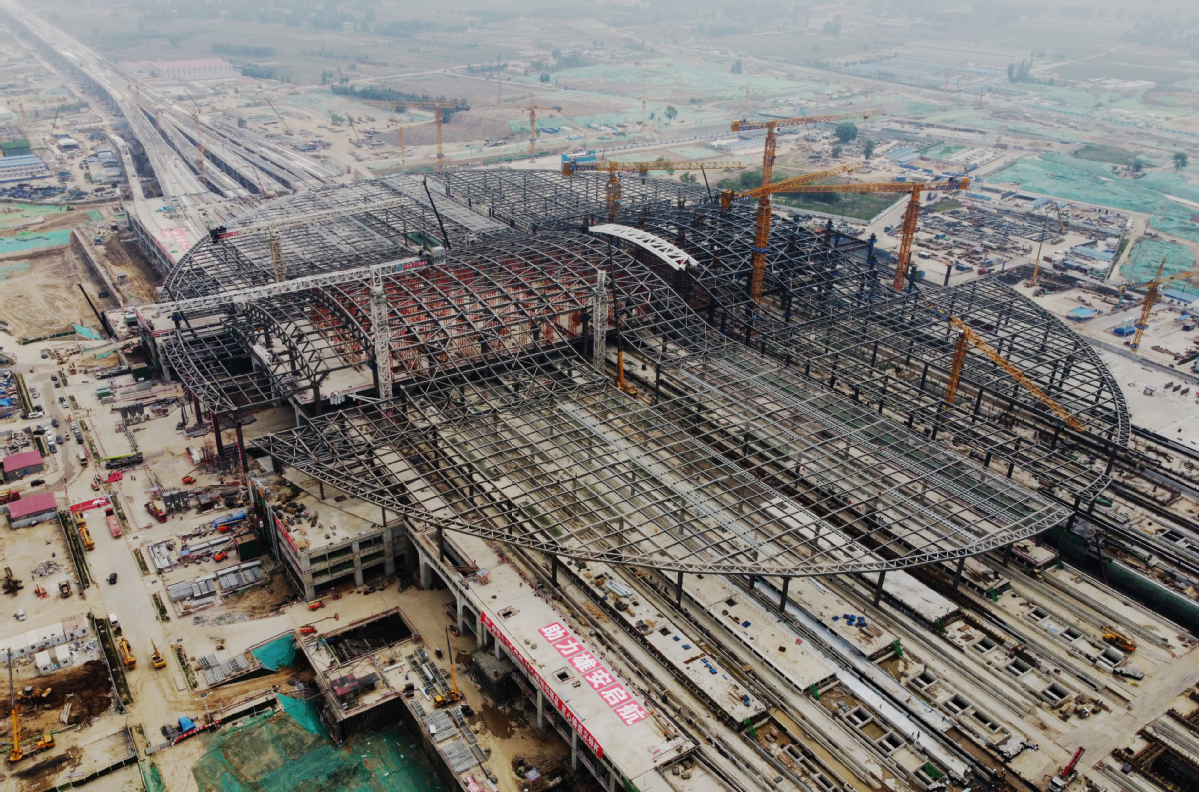New railway station in Xiongan set to start operations by end of this year


Xiongan railway station is set to be operational by the end of this year, business executives involved in its development said. It is the rail traffic hub of the Xiongan New Area, China's new landmark economic zone.
Located 20 kilometers from the Xiongan New Area in Hebei province and with a construction area of 475,200 square meters, the station is the largest of its kind in China.
It was designed and constructed by a number of centrally administrated State-owned enterprises such as China Construction Technology Consulting Co Ltd and China Railway Construction Engineering Group.
China Architecture Design and Research Group, one of CCTC's subsidiaries, is the main co-designer of Xiongan railway station. It is responsible for the architecture, landscape, interior, human settlement, building intelligence, and building economy design of the station.
With an investment of about 8 billion yuan ($1.13 billion), the station is a convergence of railway services, including the Beijing-Xiongan Intercity Railway and the Tianjin-Xiongan Intercity Railway.
The traffic hub is an integration of station and urban space as well as city and transport functions, said Xiu Long, president the of China Construction Technology Consulting Co Ltd, or CCTC.
Intended as a green and intelligent traffic system, the column grid and story height of the supporting facilities were designed with a modern tradition compatible mode to meet the demands of future development, he added.
The main body of the station is formed by five floors, including three floors above ground and two floors which are underground. The first floor contains the ground entrance, and the station can be entered in four directions.
As an essential part of a city, the intelligence of buildings and infrastructure facilities is the key to developing future smart cities. Smart technologies have been adopted in the station to realize information sharing and unified management, said Cui Kai, chief architect of CCTC.
The station's design focuses on passenger convenience and energy-saving as part of efforts by the builders to protect the overall environment of the Xiongan New Area, Cui added.
China State Railway Group Co, the country's railroad operator, said Xiongan railway station is the biggest among the five stations along the 92.4-kilometer-long intercity railroad linking Beijing and Xiongan. The other four stations are Daxing, Beijing Daxing International Airport, Gu'an East and Bazhou North.
Apart from their role in designing Xiongan railway station, CCTC is also responsible for planning, urban design, project research, architectural design and engineering in many projects of the Xiongan New Area.
Supported by more than 13,000 employees in China and overseas, this central SOE has completed design works of more than 61,000 projects in 42 countries and regions over the past six decades.
With 11 subsidiaries such as China Architecture Design and Research Group and China Urban Construction Design and Research Institute Co Ltd, the Beijing-headquartered group forms an integrated industrial structure of architectural design, urban construction planning, urban municipal administration, building standards, construction information, urban planning, engineering consultation, interior decoration, garden greening, and residential research and development.
Feng Hao, a researcher at the National Development and Reform Commission's Institute of Comprehensive Transportation, said it currently takes about 90 minutes to travel between Beijing and Baigou Railway Station, located in an area neighboring Xiongan, or to Baiyangdian Railway Station, which is in the new area.
It will take just 36 minutes to reach downtown Beijing when the Xiongan railway station is opened, he said.
"Xiongan railway station will be a key transport hub in the Beijing-Tianjin-Hebei region and play a key role in undertaking Beijing's non-capital functions," he said.
Under the government plan, the railway station project will make Xiongan a key transportation hub which is well connected with the central, southern, northwestern, southwestern and northeastern parts of China.
In a master development plan for Xiongan New Area published in 2018, the country described the new region as having "national significance" in the same way as the Shenzhen Special Economic Zone and the Shanghai Pudong New Area.
By the middle of the century, Xiongan will become a significant part of the world-class Beijing-Tianjin-Hebei city cluster, effectively performing Beijing's non-capital functions and providing a Chinese solution to "big city malaise", according to the plan.




































